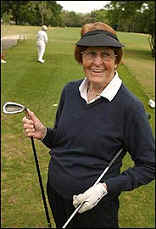|
|

Golf Widows Take Up the Game but Play It in a Different Spirit
By Dennis M. Blank, The New York Times
April 13, 2004
Every year, thousands of women who have moved to Florida for retirement decide to take up golf. What better way to spend more time with their husbands?
That is not always how it works out.
"We talk, but we don't talk about the game," said Mary Ann McLaughlin, 67, of Fort Myers, who three years ago, after retiring from nursing, took up golf to play with her husband, Marty, 67. "He takes it very seriously. `If it is not any fun, then why do you do it,' I ask him. So I don't understand his motivation and he doesn't understand mine."
The McLaughlins are far from alone.
"I don't care to play with her," said Fred Lantz, 68, of Mount Dora, Fla., a retired jewelry salesman, about his wife, Brenda, 64. "I guess I am a little too competitive. I don't have the patience."
For many such couples, the answer has been a sort of separate but equal golfing arrangement. The Lantzes, for example, have found it better to play with men's and women's groups than with each other, as have the McLaughlins.
"I am not a serious golfer," Mrs. McLaughlin said, "so in order of importance, it is lunch, life with the ladies, fresh air and sunshine, and golf comes fourth."
According to the National Golf Foundation, more people in their 50's and above are taking up the sport nationwide, and among them a growing number of women, jumping to 642,000 in 2002 from 608,000 in 2001 in Florida alone.
Golf is clearly playing a more prominent role in the lives of retirees, who have the choice of more than 1,000 courses in the Sunshine State. Catering to that strong interest, more developers are building subdivisions around golf courses.
Whatever led them to take up the sport, women like golf for companionship and social reasons, more than the game itself, whereas men are more competitive.
"It gets us out of the house to be with good friends, good sunshine and it is something you can do rather than just sitting out on the porch, rocking," said Mary Bodanza, 73, from Umatilla, Fla., who started golf at age 62. In addition to being on the Mount Dora Golf Club course three or four times a week, she also teaches water aerobics and computer science at a local college.
Ruth Clayton is a spry 90-year-old whose eyes light up when she talks about golf, which she learned at age 17. "I rode a bicycle and played shuffleboard, but there is something about golf that is more challenging," said Mrs. Clayton, who plays nine holes twice a week in Mount Dora. "I love it. My energy level is low so I get excited about doing it."
Nancy Berkley, who follows golf trends and is the author of "Women Welcome Here! A Guide to Growing Women's Golf," said that older women often find the social aspect most inviting. On the downside, she says women are at first "intimidated by golf because it looks hard to them."
Because some older women have ailments, they have lost interest in the game, but good golf teachers are recognizing this and helping them to develop a three-quarter swing, Ms. Berkley said.
Jennifer Folino, a golf teacher at the Tournament Players Club in Valencia, Calif., says she instills confidence in women by holding golfing clinics only for them. "Women perform better in groups with other women encouraging them," Ms. Folino said.
"All of us have some infirmities," Ms. Bodanza said. "I have had a hip and knee replaced, but I can still play golf. But that wouldn't be the same with tennis where you would probably have to give it up."
The Callaway Golf Company in Carlsbad, Calif., has introduced the Game Enjoyment System, a set of clubs that are lighter and designed with a lower center of gravity for higher shots, which makes it easier for women to play golf.
"Calloway decided to go after this market and that is very significant," Ms. Berkley said. "For women with slow swing speeds, this helps them to get the ball in the air."
A spokesman for Callaway, Larry Dorman, said the system "is helping to keep women in the game."
"From the letters we were getting," Mr. Dorman said, "it was very frustrating because they were getting very little difference hitting a five-iron or seven-iron. So this enables them to see a difference in their swing."
Mr. Dorman said the company also recognized the need for the clubs because some women beginners were finding the game too hard.
"This is especially true for beginners or those who don't have the opportunity to play very often," said Ron Drapeau, Callaway's chief executive.
The clubs can make it easier for a woman with physical problems, like an elbow that is hard to straighten. But it is up to the women themselves to straighten their husbands out. And some say they have succeeded.
"He knows better than to correct me," said 86-year-old Marian Johns, a retired nurse from Mount Dora, about her husband, Earl, 80, "He encourages me and tells me not to lose my confidence because that is my biggest problem."
Betty Maines, 74, who lives in Tavares, Fla., learned to play 15 years ago when her husband, Clifford, also 74, taught her the game in their backyard. They play separately twice a week and together on Sundays.
"At first it was terrible because he was always telling me what to do," Mrs. Maines said. "Now he knows to be quiet."
|
|



